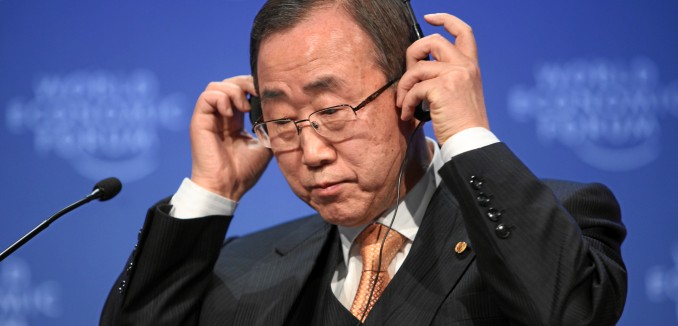Last month, while visiting refugee camps in southern Algeria, United Nations Secretary-General Ban Ki-moon described Morocco’s 1975 annexation of Western Sahara as “occupation.” In doing so, he broke an unspoken UN rule.
Allegations of occupation are not used when describing China’s relationship with Tibet, nor Russia’s relationship with Ukraine, nor Turkey’s relationship with Cyprus—and as the Secretary-General learned, nor Morocco’s relationship with Western Sahara.
At the UN, allegations of occupation are solely reserved for Israel. This helps explain Morocco’s furious response. The government ordered the UN to withdraw dozens of staffers from its peacekeeping mission in Western Sahara and threatened to pull its soldiers and police from international peacekeeping missions.
UN spokesman Stephane Dujarric couldn’t backpedal fast enough. He told reporters that Ban’s “use of the word was not planned, nor was it deliberate. It was a spontaneous, personal reaction. We regret the misunderstandings and consequences that this personal expression of solicitude provoked.”
Refusing to be mollified, Morocco’s foreign ministry accused the Secretary-General of partiality and released a statement saying, “At this level of responsibility, words have meaning, political and legal consequences, and personal opinions have no place.”
I couldn’t agree more. Words do have meaning. Personal opinions should not manifest as political proclamations. And yet, when it comes to accusing a state of occupation, the assertion is purely political. That’s why it’s reserved for Israel, and Israel alone.
Addressing the UN Security Council in January, the Secretary-General set aside his obligation to serve as an impartial arbiter and asserted, “It is human nature to react to occupation, which often serves as a potent incubator of hate and extremism.”
When the Israeli government protested, the Secretary-General doubled down by authoring a New York Times op-ed criticizing Israel’s occupation. “No one can deny that the everyday reality of occupation provokes anger and despair, which are major drivers of violence and extremism,” he wrote.
The UN’s psychologist-in-chief interpreted the Rorschach of history and human nature and concluded that the price to be paid by an occupying power is for its citizens to be the victims of violent terrorism. This is a politically expedient, but inaccurate conclusion.
Earlier this year, Oxford University Press published an academic study of more than 2,000 militarized disputes that have taken place since 1816. The authors assessed territorial conflicts and found that only 29 percent escalated into war within five years. In other words, the empirical evidence demonstrates that it is not human nature to react to a territorial conflict with violence.
Members of the international community have entrenched notions as to the underlying cause of the Israeli-Palestinian conflict. Unfortunately, these notions are often rooted in bias and tired assertions, such as the claim that the violence is a reaction to Israel’s denial of a Palestinian state.
On three separate occasions Israel has offered the Palestinians a state, and in each instance the Palestinian leadership refused the deal or walked away from the table. That’s more than China, Russia, Turkey, or Morocco has ever put on the table to resolve their disputes. And yet no other country gets told that terrorism against its citizens is the “natural” response to occupation.
To paraphrase George Orwell, all peoples are equal, but some peoples are more equal than others. The Sahrawi people have been waiting twenty-five years for a referendum to choose between independence or integration with Morocco. Defending their rights is a footnote to the diplomatic showdown over Western Sahara. Truth, justice, and equality are also footnotes in this dispute. At the UN, points are scored for political pontification, not meaningful solutions.
Aviva Klompas served from 2013 to 2015 as Director of Speechwriting for Israel’s Permanent Mission to the United Nations.
[Photo: World Economic Forum / Wikimedia]




